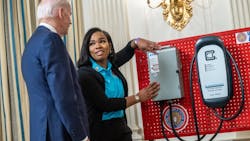Biden vetoes Congress’ attempt to scrap Clean Truck Plan
With a message to Congress that not implementing new federal heavy-duty emissions standards would squander “an opportunity to lead on the defining crisis of our time,” President Joe Biden vetoed a joint resolution to overturn the regulations.
Using the Congressional Review Act, legislators last month overturned new Environmental Protection Agency regulations that are part of the federal Clean Truck Plan that went into effect in March. The new emissions regulations give OEMs less than four years to apply the stringent rules for heavy-duty trucks and engines by model year 2027.
“Today, President Biden chose to prioritize his extreme environmental agenda over bipartisan pushback from Congress,” Senator Deb Fischer (R-Nebraska), lead sponsor of the resolution, said on June 14. “This veto is more than just a slap in the face to truckers, who transport nearly every consumer good. Pushing this excessive regulation forward will also raise prices for families already grappling with inflation. I’ll continue to work with my colleagues on ways to push back against these devastating government mandates.”
See also: EPA proposes even stronger pollution standards for all trucks and cars
The EPA's goal is to decrease air pollution, including pollutants that create ozone and particulate matter, by increasing emission reductions over time as newer and cleaner vehicles enter the market. The EPA estimates that the rule would reduce heavy-duty vehicle NOx emissions by 40% by 2040. The rule is intended to have most large trucks running on low- or zero-emission powertrains by 2045, reducing NOx emissions by nearly 50% compared to current levels.
“The rule cuts pollution, boosts public health, and advances environmental justice in communities across the country,” Biden said in a message to the Senate that accompanied his veto. “It will prevent hundreds, if not thousands, of premature deaths; thousands of childhood asthma cases; and millions of missed school days every year.”
The resolution passed both houses of Congress by a vote of 50-49 in the Senate (with just one Democrat joining Republicans to vote for repeal) and 221-203 in the U.S. House of Representatives. It would take two-thirds of both houses to override the veto.
“The resolution would deny communities these health benefits by resulting in weaker emissions standards for heavy-duty vehicles and engines, which are significant sources of pollutants that threaten public health,” Biden added. “If enacted, the resolution would squander $36 billion in benefits to society—and an opportunity to lead on the defining crisis of our time.”
Clean Truck Plan repercussions
EPA estimated that the technology needed to meet new emissions standards would cost between $2,500 and $8,300 per truck. The American Truck Dealers Association said it could cost $42,000 per new truck. Costs associated with regulation could reach $55 billion over the lifetime of the program, according to Fischer’s office.
To meet the standards for heavy-duty commercial vehicles, NOx emissions must not exceed 0.035 grams per horsepower-hour during regular use, 0.050 grams on low load, and 10 grams while idling. The new regulations also include extended warranties, from 100,000 miles to 450,000 miles, and longer useful life for covered commercial vehicles, from 435,000 miles to 650,000 miles.
See also: New tech: Of unicorns, rainbows, and disillusionment
The new rules are the first step in the EPA's three-part Clean Truck Plan, which will be followed by the proposed Phase 3 GHG standards for heavy-duty vehicles starting with model year 2027 trucks. The other part of the plan includes multipollutant standards for light- and medium-duty vehicles.
“President Biden has yet again stood against attempts to undermine public health and supported our ongoing move to cleaner vehicles,” Elizabeth Gore, Environmental Defense Fund’s SVP for political affairs, said. “The EPA’s commonsense protections will minimize health harms and save lives all across the country.”
In a statement after the veto, Fischer noted that the regulations could be challenging to implement because as the costs for new equipment rise, more companies—particularly small fleets and independent drivers—would keep older trucks on the road longer. She noted that the rising costs of cleaner trucking equipment would likely be passed on to consumers.
“While we are disappointed in the President’s decision to veto this bipartisan legislation, we thank the Democrats and Republicans in Congress who put politics aside in support of small business truckers simply trying to navigate wave after wave of EPA regulations," Todd Spencer, president of the Owner-Operator Independent Drivers Association, said. "As the White House issues their veto, EPA is working to finalize another round of burdensome emissions requirements and pushing for electric commercial trucks without any practical concern regarding purchasing costs, mileage range, battery weight, or charging availability.”
More than 70% of all American goods are moved by trucks, according to American Trucking Associations. Modern diesel equipment emits 99% less emissions than the same class of equipment built before 1988, according to ATA. Nearly half of all Class 8 trucks operating in the U.S. predate 2010, when the EPA last implemented significant diesel emissions reductions on truck and engine manufacturers.
About the Author
Josh Fisher
Editor-in-Chief
Editor-in-Chief Josh Fisher has been with FleetOwner since 2017. He covers everything from modern fleet management to operational efficiency, artificial intelligence, autonomous trucking, alternative fuels and powertrains, regulations, and emerging transportation technology. Based in Maryland, he writes the Lane Shift Ahead column about the changing North American transportation landscape.

